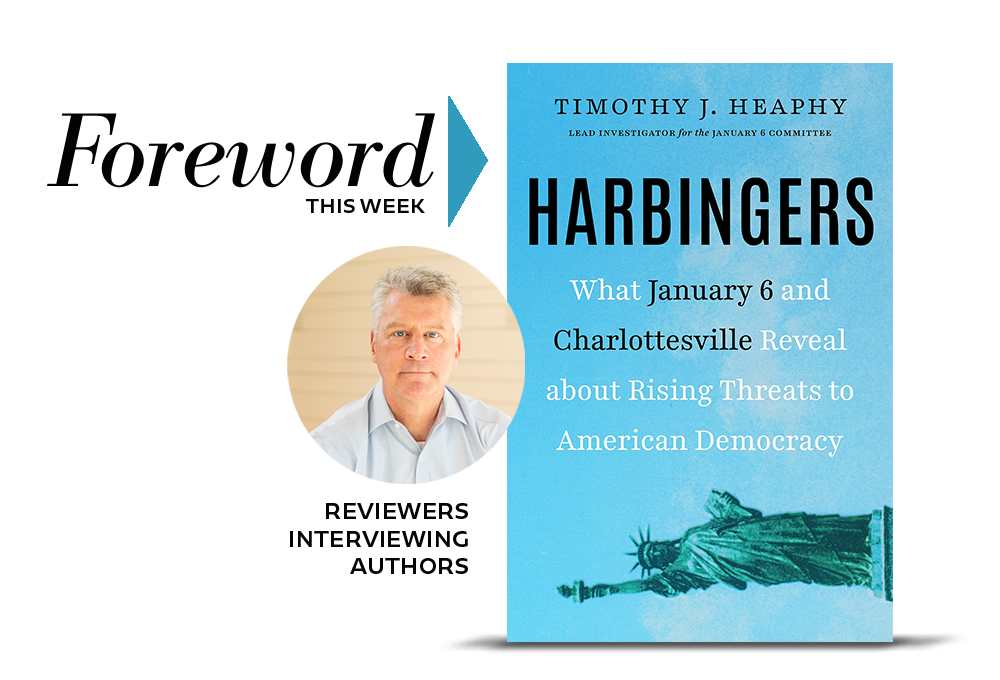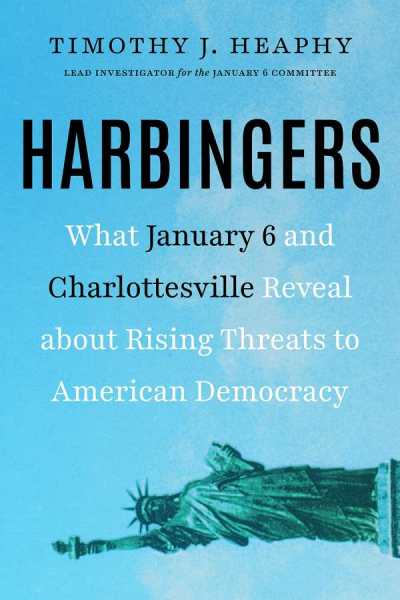Reviewer Jeff Fleischer Interviews Timothy Heaphy, Author of Harbingers: What January 6th and Charlottesville Reveal about Rising Threats to American Democracy

“The attack on the Capitol was almost successful and was thwarted only by a handful of brave patriots who defended democracy that day. Democracy comes down to people being willing to do the right thing to protect and preserve our freedoms. The book tries to spotlight the individual responsibility we all share to protect democracy.’’ —Timothy Heaphy
Rather than disqualifying him, the 2017 Unite the Right riot in Charlottesville and the January 6 US Capitol insurrection helped put Donald Trump back in the Oval Office. Those two events served to crystallize the anger, cynicism, and complete distrust in institutions felt by the 77 million who voted for him this past November.
Worse than being a hard pill to swallow, facing that reality—he tried to overturn an election, for God’s sake—is impossible to comprehend for Harris’s 75 million supporters.
But try they must, and today’s guest may have more insight than anyone to help the left better understand the right.

Meet Timothy Heaphy, lead investigator of both Charlottesville and January 6 and the author of Harbingers: What January 6th and Charlottesville Reveal about Rising Threats to American Democracy.
Jeff Fleischer reviewed the book in Foreword’s January/February issue and fired off the following burning questions to Tim.
Every bimonthly issue, Foreword reviews more than one-hundred new books, fiction and nonfiction, from independent publishers and university presses. Register for your free digital subscription here.
What was the inspiration for writing a book based on your experience investigating Charlottesville and, later, the January 6 attack?
Having investigated the facts and circumstances surrounding both the Unite the Right rally in Charlottesville in 2017 and the January 6, 2021, attack on the Capitol, I saw a lot of parallels between those events. My work on those investigations also provided some insight into the state of our democracy. I wanted to write about both of those lessons—the common contexts and similarities between Cville and J6, as well as the broader issues they reveal about the state of our democracy.
The book does a great job of explaining some of the ways in which law enforcement wasn’t fully prepared for the events of those two days. What progress have you seen since that time?
I’m not sure we’ll have an answer to that question until there’s another event that raises the prospect of political or racial violence. Many of the police organizations we criticized in these reports have undergone leadership changes. The US Capitol Police have improved their intelligence-gathering process and received additional resources. I’m not sure, however, that these organizations have gotten better at information sharing or recognizing and working to counteract implicit racial bias. It is sometimes difficult to protect both free speech and public safety, though law enforcement must do both in the context of these mass demonstration events. They will continue to fail to adequately protect both values unless they cure the systemic issues identified in the book.
What most surprised you as you compared the two attacks? What did you discover in comparing the two when working on the book?
The biggest surprise for me with respect to both attacks was how many people came together to express extreme anger at government and other institutions. These events show how broad and deep American distrust of institutions has become. Charlottesville was more than a handful of angry white racists emerging from the dark corners of the internet. The attack on the Capitol was almost successful and was thwarted only by a handful of brave patriots who defended democracy that day. Democracy comes down to people being willing to do the right thing to protect and preserve our freedoms. The book tries to spotlight the individual responsibility we all share to protect democracy.
From your own investigation into January 6, what findings do you feel have been most overlooked or ignored in the years since the public January 6 congressional hearings?
The Select Committee’s hearings and final report correctly assign blame for the attack on the Capitol to President Trump and a number of co-conspirators. While the committee assembled evidence of that culpability, it also developed the crucial contexts that allowed the attack to happen. The attack revealed systemic failures of law enforcement to operationalize intelligence and the role of social media in organizing events and disseminating misinformation. I try to develop those contexts with more specificity in Harbingers.
What steps should law enforcement be taking now to prepare for Donald Trump going through with his plan to pardon January 6 criminals?
I don’t see this as a law-enforcement issue, but rather a political one. Law enforcement will always be alert to domestic terror threats and other patterns of criminal conduct, regardless of who is responsible for those threats.
What do you most hope the audience comes away with after reading Harbingers?
The book is meant to be hopeful and encourage readers to directly engage in the effort to protect democracy. We cannot wait for our elected officials to solve this problem but should instead take individual responsibility to ensure we continue to live in a democracy. I hope readers do more to engage with their fellow citizens, particularly those with differing experience and perspectives. I hope they find ways to participate in civil life—by voting and other ways to register their opinions. I hope our government incentivizes shared experience through a national service program and other ways to bring Americans together in common cause. I think there is more that unites us than divides us, so the raw material for a thriving democracy remains.
Jeff Fleischer
